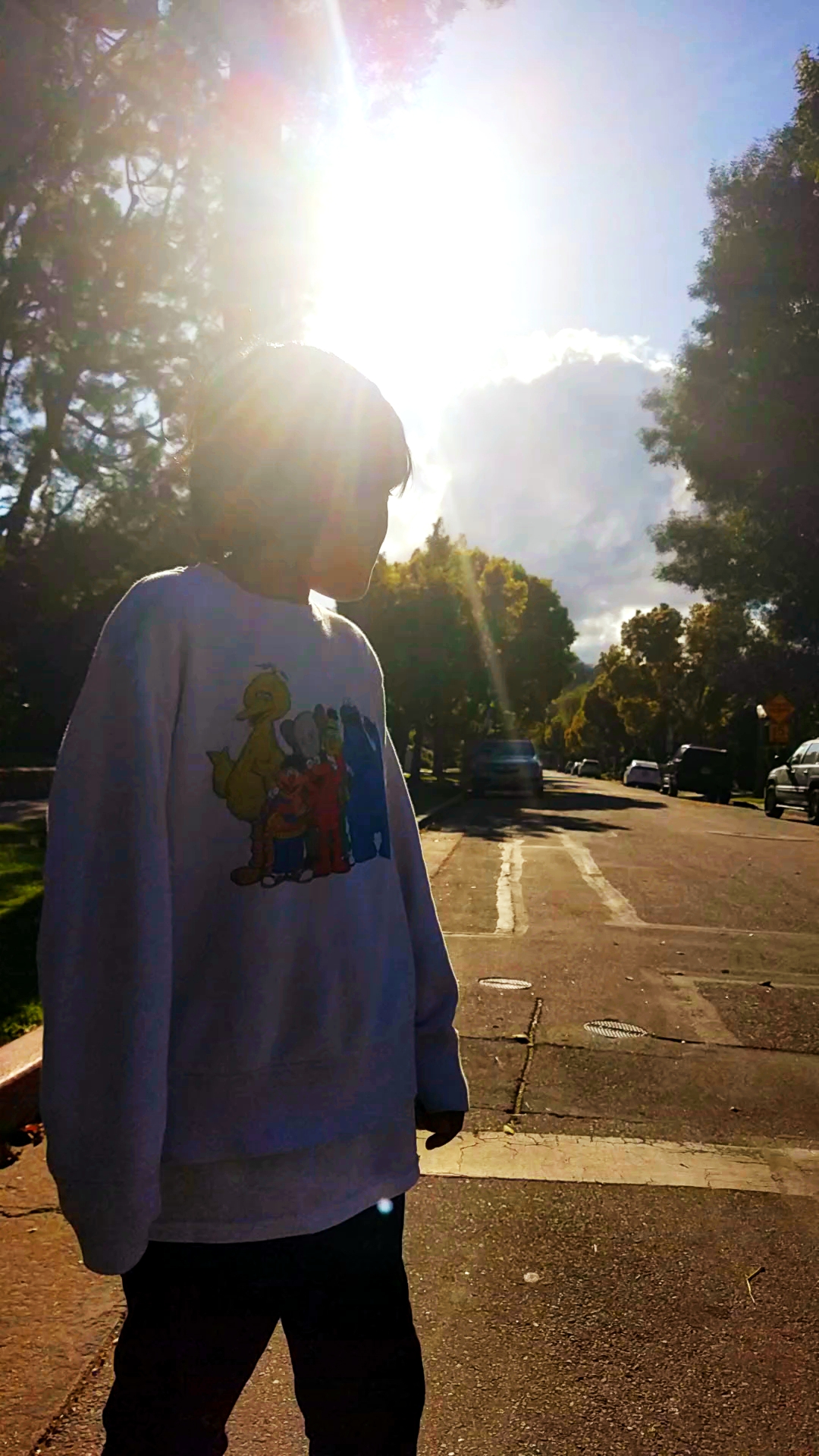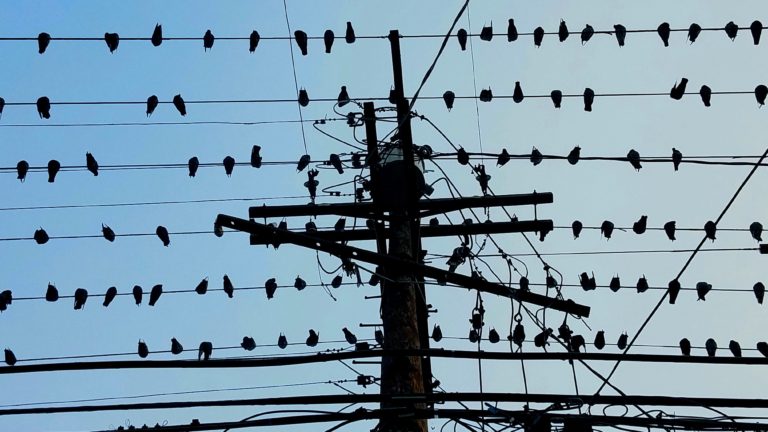Rosalia Scalia – Fiction
She locked the door and turned off the lights. Together, they moved bookcases in front of the door and piled...

THE MIRACULOUS LEAVES OF MEAT-EATING PLANTS
Grandma Lydia, who had been dead for ten years, woke Belinda up in the middle of the night. She appeared bathed in a bright orange glow that illuminated Belinda’s room like a fireworks display. The glow shined so bright that Belinda could see it with her eyes closed.
“Wake up, Sassy Girl!” she said without speaking, sending thoughts into Belinda’s mind.
When she opened her eyes, she saw her grandmother at the foot of her bed. She looked the way she did in pictures with Grandpop Luck with 1950s hair and a smooth, young face, deep dimples around her mouth like parentheses. When she appeared to Belinda, Grandma Lydia always looked younger than she was at the time she died.
“We need to talk,” she said, then sat down on the bed.
Belinda felt her mattress depress with her grandmother’s weight, which told her she was not dreaming. Still wrapped in her blanket like a burrito, Belinda raised her head to see if Grandma Lydia came alone. Usually, she brought someone for Belinda to meet because they wanted her to deliver a message to loved ones still on the earth plane, and sometimes Grandpa Luke, who died before Belinda was born, came with her. This time, she appeared alone.
“Where’s the others? You usually have company,” Belinda said.
“They’re all busy,” Grandma Lydia said. “Plus, we have business that doesn’t include anyone else.”
“What kind of business? Why can’t we ever talk during the day?” Belinda asked. She felt groggy with sleep. She yawned and then rubbed the woven fabric of her blanket, running her fingers to and fro across the knitted pink and blue threads before glancing out the bedroom window. The night sky looked like ink, velvet, and fudge with no moon or stars. “What time is it anyway?” Belinda glanced at the clock radio on her night table and saw 3 a.m. “You already know I can still see and talk to you and all your friends during the day,” Belinda said. She felt herself drifting back to sleep. “Why do you always like to come in the middle of the night?”
“Pay attention!” Grandma Lydia sounded snappy.
“What’s so important? I don’t want to know anything I can’t control,” Belinda said. She rubbed her eyes again, felt the weight lift from the foot of her bed, and realized her grandmother was now floating beside her.
“Sit up and listen, Sassy Girl. You and Bobby stay home from school tomorrow.” She sounded as if she was commanding her instead of suggesting.
Belinda laughed. “Come on… You know Mom when it comes to missing school. That’s never going to happen.”
The first time Grandma Lydia had appeared in the middle of the night, Belinda was six. Unbeknownst to Belinda, Grandma Lydia had just died in her own house fifteen minutes away. But there she was that night, bathed in an orange light, telling Belinda that she was all right, that she loved her and her mom too, and to get ready because this time next year, she’d have a baby brother. Later when Belinda told her parents about Grandma Lydia’s visit, her mother told her it was a dream, but her father believed her, saying, “The world is full of mysteries.”
Now in her mind’s ear, her grandmother was telling her to play hooky from school. “I’ve never given you a bum steer, Sassy Girl,” Grandma Lydia said. “Do it yourself. Play sick. Convince Mina. Just stay home tomorrow. Keep Bobby with you too.”
But Belinda liked school and didn’t want to stay home. She loved science and relished the fact that her science project from last year still required her attention. She’d won first place for her project titled “The Miraculous Leaves of Meat-Eating Plants,” showing an array of carnivorous plants like the Venus flytrap, the Attenborough’s pitcher plant, and her favorite, the savage bug-eating plant called bladderwort that features long, slender stems topped with small, colorful flowers. Belinda continued caring for the collection in the science lab and dreamed of becoming a botanist one day.
“You really need to be talking to Mom.”
Grandma Lydia waved that suggestion away. “Bring him to the mall. Go somewhere, anywhere else. A movie or something. Listen to me, please.”
After Grandma Lydia’s initial visit when Belinda was six, a parade of spirits began coming, and they frightened her. She’d scream in the middle of the night, waking everyone with what her mother called “nightmares.” Her father had held her, saying no one else lived in his house because they couldn’t afford the rent. His practical reasons why no one else lived in their house brought no comfort because the spirits kept visiting her until Grandma had taught her how to turn her antenna off and on. Grandma herself always ignored Belinda’s off signal, which was set on permanently off, showing up whenever she wanted, and now as her grandmother’s light faded, the orange glow surrounding her dimmed until it shrunk to the size of a pinprick, then winked out.
Belinda fell into a deep slumber and dreamed she, her mother, and Bobby were driving an unfamiliar car in Ocean City, where seawater had risen to threatening levels. They were evacuating the city, thwarted at every turn: the streets narrowed into impassable widths, stopping their car from proceeding; then their car suddenly transformed into a giant red wagon before a pimpled-faced boy with chin-length chestnut hair appeared out of nowhere and stepped in front of their vehicle, wielding a gun and pointing it straight at Belinda. In the dream, she reached from the back seat of the car-turned-wagon, grabbed his hand, and bent it and the gun skyward until the gun disappeared. After that, the gun-toting boy minus the gun decided they were friends, that he loved them all, and joined their escape from the rising seawater, although Belinda remained wary of him. He acted grateful to be in their company.
The dream ended when the alarm rang, jerking her awake. She couldn’t shake the dream’s vividness, the menace of the pimply-faced boy who first wanted to shoot her and then be her friend. She forgot about Grandma Lydia and focused on the day ahead, specifically the math exam scheduled for fourth period, as she slipped into her gray-and-blue uniform. She texted her best friend, Francie, like she did every morning.
“Math exam today. Hope it’s not too hard,” she texted.
In the kitchen, her mother, Mina, was breaking eggs into a blender jar—her way of speeding up the scrambled egg prep. She wore a new dress with a tangerine print, one that Belinda had not seen before. Her mother loved clothing with loud colors, colors that screamed, something Belinda hated. The dress glimmered in the sunlight-bathed kitchen as Mina moved, and suddenly Belinda remembered Grandma Lydia. Mina poured milk into the blender jar, dropped in salt and pepper, a teaspoon of baking powder, and a shot of hot sauce before setting it on its base and hitting the power button. While the blender whirled, Mina stuck four pieces of bread into the toaster before emptying the egg concoction into a pan already sizzling with olive oil and butter.
“It’s going to be a bear at work today. I need you to pick up Bobby from after-school care; then I’ll pick you both up on Holton Avenue. I don’t want to go all the way up that dang driveway. The breezeway is always nuts.”
“Maybe it’s better if we stayed home today,” Belinda said.
Her mother shot her a side-eyed glance. “What a joker you are today! Have you lost your mind?”
“It might be better if me and Bobby stayed home.”
“It’s ‘Bobby and I,’ and nothing doing,” Mina said. “What you put in your brain can never be taken away. Don’t you have a math test today?” her mother asked.
“That’s not why I want to stay home. Grandma Lydia said Bobby and I should avoid school today.”
“Oh please, Belinda. You’re ready to drive soon. Why are you using your dead grandmother as an excuse to play hooky? At least think of a better story.”
“It’s the truth,” Belinda said. “She predicted Bobby would come, didn’t she?”
“She didn’t. That’s ridiculous. Missing school days won’t get you into a good college.”
“Attendance won’t matter. Come on, Mom. Grandma Lydia has never given me a bum steer,” she said, echoing her grandmother, who now occupied a kitchen chair.
“Tell her you’ll do all the laundry and cleaning,” Grandma Lydia said. She took a drag off a cigarette and blew smoke rings into the air.
Belinda rolled her eyes at her grandmother but repeated the bit about laundry and cleaning. Her mother laughed. “Desperado! You’re sure funny this morning. I know how much you love chores,” she said, exaggerating the word love.
“She’s here now,” Belinda said. “Can’t you smell her cigarettes?”
Her mother washed her hands in the kitchen sink and then dried them with a paper towel.
Grandma Lydia sent more telepathic messages to Brenda.
“She said relax because your important meeting is not happening. It’s going to be rescheduled,” Brenda repeated.
“Stop it,” Mina said. She tossed the used paper towel into the trash.
“You never believe me,” Belinda said. “You know I can talk to people on the other side.”
“Enough with the woo-woo stuff. It’s getting old. If you talk about this shit outside the house, you’ll end up in a mental health facility.” Then she tilted her face to the ceiling and yelled, “Bobby! Bobby! Wake up.”
Grandma Lydia crossed her arms. “Cheeky, Mina,” she said, which made Belinda laugh. She repeated it to her mother, who failed to see the humor. Grandma Lydia urged her to try again.
“Both of us have good grades. Missing one day isn’t going to matter,” Belinda said. She imagined her carnivorous plants, growing larger and staying healthy with the worms she fed them, and calculated if they could go another day without eating something. She imagined her other project waiting for the science teacher’s approval of teaching current ninth graders about how to care for them. Maybe she’d get the green light today or tomorrow if she and Bobby stayed home.
“You know the rules. Unless you have a fever or you’re dead, you go to school.”
“Tighter than a crab’s ass. She needs to lighten up,” Grandma Lydia said. She took another drag and began exhaling smoke rings.
“Mom, please let us stay home today. We can make up the work. Grandma Lydia said to avoid school today.”
“Enough. Why doesn’t Grandma Lydia and those other dead people you claim to see and talk to ever give you winning lottery numbers or something useful?”
Grandma Lydia shook her head. “I am giving you something useful. Two useful things. The meeting isn’t happening, and the kids should avoid school today. Wake up, Mina,” she shouted.
Belinda repeated the message. Her mother stared at her. “You sure have an active imagination. You sure did inherit Lydia’s love for drama.”
“Come on!” Grandma Lydia said before she vanished. Belinda smelled the cigarette smoke permeating the kitchen.
“Don’t you smell the smoke?” Belinda asked.
Her mother didn’t answer. Instead, she hurried out of the kitchen toward Bobby’s room.
Maybe it was just a dream. Maybe she did have an overactive imagination. She set breakfast out on two plates, one for her and one for Bobby, now seven. She fixed them both sandwiches for lunch before Mina returned with a yawning Bobby in tow.
“Time for breakfast, Bobby,” Mina said. To Belinda, she said, “Spider-Man here also wants to stay home. Some kind of conspiracy is afoot.”
“I dreamed a monster was chasing me,” he said. “It wanted to eat me.”
“No monsters in my house,” Mina said, echoing their late father. “They can’t afford the rent.”
Belinda laughed, remembering their dad. She often wondered why Grandma Lydia visited and their dad didn’t. Then remembered she turned her antenna off, something her grandmother ignored.
“What’s so funny?” Bobby asked.
“That’s what Dad used to say when I was your age,” Belinda said. She wondered if Bobby saw dead people, orbs, and light beings too.
Belinda’s phone buzzed with a text from Francie: “Studied my ass off and will be lucky to get a ‘C.’”
Belinda texted back. “Might stay home.”
Francie replied: “Why? What’s going on?”
Belinda. “I might skip today.”
“Math is my worst subject. Not like you. Can’t afford to miss a test,” Francie texted back.
Belinda was afraid to tell Francie or anyone outside her family about talking to spirits. Tall Oaks Academy was not the kind of place where someone with her abilities would be considered sane. If that got around, she’d have no friends, and making friends did not come easy for Belinda with her head filled with facts about plants, a mouth full of braces, and Coke-bottle glasses. Her big red hair that looked like a bird’s nest on fire didn’t help. She believed the other kids tolerated her because they liked her carnivorous plants, the Venus flytraps with their two-hinged leaf blades and guard hairs, Cape sundews with their brightly colored, hairlike tentacles, and the array of pitcher plants with their pitfall traps.
“Mom, we should stay home today. For real.”
“Just stop.”
“Mina lost faith in her own skills,” Grandma Lydia said in her left ear, though Belinda couldn’t see her anywhere.
“Why is it always Grandma Lydia and not your father? Don’t you ever see your dad?”
She had seen him one time after his heart attack when he first transitioned. He waved and blew kisses at her the night he died before vanishing, but she knew she’d turned off her antenna. “Maybe he has other stuff to do,” she said.
Ten minutes later, they were headed toward school, but Belinda worried about Grandma Lydia’s warning. Her mother, preoccupied by plans for Belinda getting her driver’s license so that she could drive herself and Bobby to school, rattled on. “I already talked to Mr. Amir about finding a cheap, safe, and reliable car for you,” she said.
Belinda tried to listen while waiting for Grandma Lydia to come through with a real reason to stay home.
“I want a car too,” Bobby said. “The Batmobile.”
“That’s not real, Bobby,” her mother said.
“Grandma Lydia warned us to stay away from school today. Maybe we should listen.”
“I’m talking to you about driving and getting you a car, and you’re playing ‘let’s pretend.’”
“She said you wouldn’t believe me,” Belinda said. “She said you have skills too.”
“Why doesn’t Grandma Lydia talk to me? I want to talk to her too,” Bobby whined.
“Now look what you started,” her mother said, her voice sharp. “You’re too old to be floating that tired story. You need to act your age.”
Her mother turned in to Tall Oaks, a school with a lush green campus filled with landscaped flower beds. With the lower and upper school in one large brick building, kids from pre-K to twelfth grades all gathered in the same uniform, rooting for the penguin mascot at sports events, thanks to the tuition their parents paid. Lined by tall oaks, the driveway snaked to the main building’s entrance, an imposing brick structure with multiple side entrances into the lower school that allowed upper-school students access to the stairwells to the top floors. Two enclosed bridges allowed students to travel to the buildings flanking the main one; the bridge on the right led to a flat-roofed building that held the gym, the pool, the school store, and the cafeteria. A left-side bridge led to a nondenominational chapel.
“It’s not a story. She told me to stay away from the school building today,” Belinda said as her mother pulled into the parking lot in front of the building with the pool. To save time, her mother rolled to a stop in the parking lot rather than getting into the drop-off line to avoid the morning traffic snarl.
“It’s not a story,” Belinda said. “Come on, Ma. It’s just one day.”
Her mother huffed. “Don’t try me.”
As Mina drove away, Belinda watched the brake lights of her car blink on and off, the car disappearing down the driveway. Dread overcame her as she opened the heavy side door. She and Bobby stepped into a spacious stairwell, the closest location to his class. Dread twisted her stomach as they exited the stairwell and entered the hallway, the noisiest place on earth with younger kids squealing, shrieking, and laughing. With each step toward Bobby’s classroom, the knot in her stomach tightened as if a hand had reached into her belly, gripped and twisted it. She imagined turning around, walking them both out of the building and down the long driveway to the retail strip across the street. She felt torn between her grandmother’s message and her mother’s expectation. Her heart thumped against her ribs.
“Leave now. Take Bobby with you,” Grandma Lydia said in her ear.
Belinda sighed. “Mom thinks we’re here,” she told her grandmother telepathically.
“Owwwww,” Bobby said. “You’re hurting my hand.”
Belinda loosened her clasp, and they proceeded toward his homeroom. She heard firecrackers exploding. No one else seemed to hear them.
“Did you hear that?” Belinda asked.
“Hear what?”
“Firecrackers.”
Bobby rolled his eyes. “No.”
Belinda heard it again.
“Did you hear it now?” she asked.
Bobby shook his head.
“How do you feel about skipping school and going to the mall instead?”
“I’m already grounded for talking back to Ms. Adams.”
When they reached his homeroom threshold, fast-popping mini fireworks boomed again. Her stomach knot tightened, and she bent over in pain. The bell rang, silencing the hallway, but the sounds of war in her ears continued. Grandma Lydia was telling her to get everyone out of the building. She squeezed Bobby’s hand.
“You’re hurting me,” he yelled, squirming to escape her grasp. Belinda held his hand tighter.
Bobby screamed, “BBBBBBBBBBBB! Let gooooo!”
His teacher glanced at them struggling just inside the classroom’s threshold.
“Belinda, what’s going on?” Ms. Adams asked.
Belinda dropped Bobby’s hand and watched him run into the coatroom. Belinda remembered it being a sizable space with lockers and wooden cubbies nailed to both sides of the walls.
“I don’t know,” Belinda said. “I have a bad feeling.”
“You’re feeling bad?” the teacher asked.
“No, I have a bad feeling. Do you hear firecrackers exploding?”
Ms. Adams stared at her. The sound of the fast-popping fireworks boomed in Belinda’s ears, though no one else seemed to hear it. “Get all those kids out of this building,” Grandma Lydia said in a commanding tone.
“We have to get all these kids out of this building.” She repeated Grandma Lydia.
“Why?”
“I can’t explain it,” Belinda said. “Just a gut feeling.”
The fast-popping firecracker sounds boomed again, but this time the teacher heard it too, and they locked eyes.
“We need to shelter in place. No time to leave,” the teacher said in a whisper. “We’ve had drills on this. Children, we are going to practice our shooter drill today, and Bobby’s sister, Belinda, is going to practice with us. Remember how we sit quietly in the cloakroom until someone comes to say it’s safe? Stay with Belinda while I tell the other teachers about the drill.”
Belinda heard the teacher banging on all the classroom doors in the hallway as she herded the kids into the cloakroom. Her phone buzzed with a text from Francie.
“Someone’s shooting at upper school.”
Belinda texted back: “In the lower school with Bobby.”
Francie replied: “Stay there. Call 9-1-1.”
The teacher returned and poked her head into the cloakroom. “Help me block the door.”
She locked the door and turned off the lights. Together, they moved bookcases in front of the door and piled books atop of them; book towers failed to cover the door’s slim glass window. Then they stacked chairs atop and in front of the bookcases, but they appeared flimsy.
“Move the teacher’s desk to block the cloakroom,” Grandma Lydia’s voice said.
Belinda rushed toward the desk, which she and Mrs. Adams pushed and pulled to the cloakroom entrance. Firecracker sounds erupted, sounding closer. They both scrambled over the teacher’s desk into the cloakroom, where the teacher opened the thick wooden doors of a supply closet and kept them open. “We must stay quiet for a long time.”
Ms. Adams dialed 9-1-1 and whispered to send help. She gripped the phone, still connected to the 9-1-1 operator.
Belinda found Bobby, and the kids around him adjusted themselves so she could sit next to him. When she looked around, she saw small children, many who had not yet celebrated their eighth birthday. In that moment, she loved them all, their spindly legs, small feet, slight hands, their tiny innocent faces, regardless of how irritating and annoying they could be. The feelings overwhelmed her. She called Mina and left a message. She kept her voice calm and even. “We’re in the lower school. We’re okay. Call 9-1-1. Someone is shooting at the school. Love you.”
She hugged Bobby, shielding him with her body.
Firecracker sounds exploded louder. The doorknob jiggled and then the door’s glass pane shattered. She trembled and whispered, “I got you,” in Bobby’s ears when a volley of shots flew around the classroom, thudding against the thick plaster walls. She glanced at the teacher, who was signaling for everyone to stay quiet. Belinda closed her eyes because she couldn’t bear to sit still. She wanted to jump out of her skin. She wanted to run into the classroom to confront the gunman, pull the gun from his hand like she did in her dream. Instead, she calmed herself by envisioning each of her delicate plants lined up in the science room window, their sharp hairs designed to trap flies and insects, the pitfall traps, the hollow, lidded leaves of the pitcher plants, the bold colors of the bladderwort. She imagined the larger plants she’d only seen in books, the ones that can trap small tree reptiles and rodents, and dreamed of seeing them in person, of studying their miraculous systems and mysterious mouths and leaves of these meat-eating plants. She imagined herself a botanist, studying all of the six hundred carnivorous plant species she reported on in her project.
“Good night, all you little fuckers,” a man’s voice yelled. A volley of firecracker sounds erupted, rattling the chairs. Gently rocking herself and Bobby, Belinda decided to turn on her antenna. Surrounding each kid, she saw a brilliant glow; it filled the cloakroom. Next to her and Bobby, Grandma Lydia’s orange radiance illuminated them as she sang a lullaby in Belinda’s ear.
You can learn more about Rosalia by linking to her bio: https://thievingmagpie.org/rosalia-scalia-bio/



